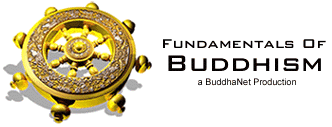

|
CONCLUSION I would like to spend a few moments by way of conclusion to reflect upon what we have done over the past weeks and relate it to what we can do now and in the future. The teachings of the Buddha are exceedingly vast and very profound. In fact, over the past weeks, we have only managed to survey a few of the fundamental teachings of the Buddha, and these too only superficially. Yet, you may feel that what we have covered is a lot, and you may feel that it is impossible to practise all that we have discussed. In fact, it is said that it is difficult even for a monk living in isolation to practise all of the fundamental teachings of the Buddha. No small wonder that it is difficult for laymen and women like ourselves who have many secular responsibilities. Nonetheless, if one succeeds in sincerely cultivating and practising even a few of the many teachings of the Buddha, then one will have succeeded in making this life more meaningful. One will be certain that one will again in the future encounter circumstances favourable to the practice of the Dharma and to the eventual realization of liberation. Everyone can achieve the highest goal in Buddhism, be he a layman or a monk. All we need to do is to make an honest effort to follow the Noble Eightfold Path. It is said that those who have realized the truth, like the Buddha Shakyamuni and His prominent disciples did not do so accidentally. They did not fall from the sky like rain, nor did they spring up from the earth like grain. The Buddha and His disciples were once ordinary sentient beings like you and me. They were once afflicted by the impurities of the mind, desire, ill-will and ignorance. It is through contacting the Dharma, through purifying their words and deeds, through developing their minds and through acquiring wisdom that they became free, exalted beings able to teach and help others to realize the truth. There is therefore no doubt that if we apply ourselves to the teachings of the Buddha, we too can attain the ultimate goal of Buddhism. We too can become like the Buddha or like His prominent disciples. It is of no use merely to listen to the Dharma or to read the Dharma.
Similarly, it is of no use merely to write articles about the Dharma,
or to give lectures about the Dharma if we do not put it into practice.
It has been said that those of us who call themselves Buddhists can
profit by occasionally taking stock. If we see that over the past
years our practice of the Buddha’s teachings has brought about
a slight change in the quality of our experience (and it will be a
slight change), then we will know that the teachings are having some
effect. If all of us put the teachings into practice, there is no
doubt that we will realize their benefits. If we seek to avoid harming
others, if we try our best to help others whenever possible, if we
learn to be mindful, if we learn to develop our ability to concentrate
our mind, if we cultivate wisdom through study, careful consideration
and meditation, there is no doubt that the Dharma will benefit us.
It will first lead us to happiness and prosperity in this life and
in the next. Eventually, it will lead us to the ultimate goal of liberation,
the everlasting bliss of Nirvana.
|
| |
|
|
|
|
|
|
|